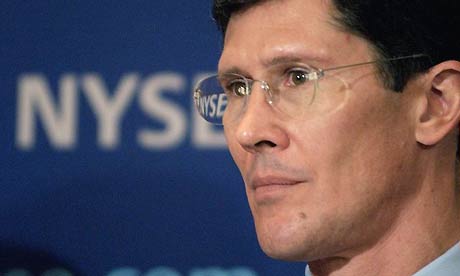Merrill Lynch's newly recruited chief executive, John Thain, stands to share a $200m (£111.4m) payout with two senior lieutenants for less than a year's work which culminated this week in the bank surrendering its 94-year-old independence.
The Wall Street bank known as the "thundering herd" agreed to a $50bn takeover by Bank of America on Monday after a hasty 48 hours of negotiation. The talks were prompted by fears over banking stability arising from the collapse of Lehman Brothers.
Thain, who was previously the head of the New York Stock Exchange, joined Merrill in December with a mandate to steer the bank out of financial trouble. When he arrived, he was given a $15m signing on bonus. If he leaves in Bank of America's takeover, he stands to get a further $11m in accelerated stock payouts.
Two former Goldman Sachs executives hired by Thain are likely to do even better. Merrill's head of global trading, Thomas Montag, who joined in August, has already received a $39m bonus. Together with stock options accelerated by a buyout, he could end the year with $76m. The bank's head of strategy, Peter Kraus, was given a $95m package including bonuses and stock awards to replace his generous compensation at Goldman when he joined in May, according to figures obtained by Bloomberg News.
It is yet to be determined whether any of the trio will have a role at Bank of America. Even by the standards of Wall Street payouts, the sums are unusually high for such a short period of employment.
Steven Hall, a New York-based executive remuneration expert, told the Guardian that Merrill had little choice but to honour the contracts: "At the time they were recruiting [Thain], a negotiation took place and he would have told them this is what his price was. You can't go back and change things now — it's almost a kind of buyer's remorse we may be seeing."
Thain, 53, is a leading fundraiser for the Republican presidential candidate John McCain. A doctor's son, he is an amateur beekeeper who used to keep hives in his back garden. He bought a two-bedroom apartment on New York's Park Avenue two years ago which had an asking price of $27.5m. He was hired by Merrill to steady the ship after huge losses on the credit markets which were run up under the leadership of ousted chief executive Stan O'Neal.
At a press conference this week to announce the buyout by Bank of America, Thain admitted that selling Merrill was not the original plan: "This isn't necessarily the outcome I would have expected when I took the job."
He insisted that he had made progress in tidying up Merrill: "We've been consistently cleaning up the balance sheet, repairing the damage that had been done over the last two or three years."
Thain reportedly fought back tears at a meeting to brief staff on Merrill's buyout this week. Analysts say that Merrill's liabilities were greater than he could have anticipated when he joined — and some have praised his decision to sell.
Defenders of Wall Street's controversial pay packages generally argue that although bankers do well during good times, they hold insecure jobs which are vulnerable during downturns.
"What we do see is that when times get tough, people lose their jobs — and that's the ultimate in pay cuts," said Hall.
A Merrill Lynch spokesman said the bank would not comment on executive compensation beyond the statutory disclosures required in filings with regulators.
